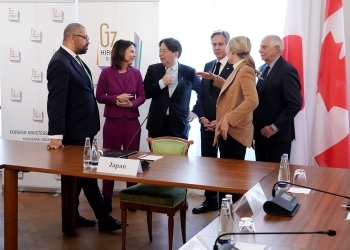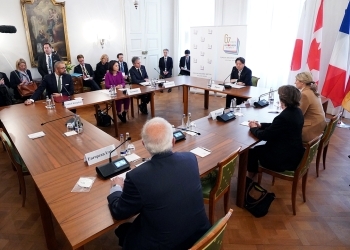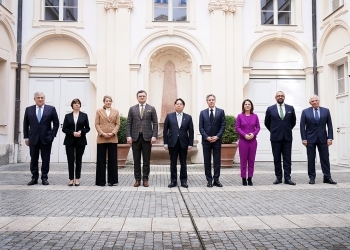G7
The G7 Foreign Ministers’ Meeting
February 18, 2023



On February 18, during his visit to Germany, Mr. HAYASHI Yoshimasa, Minister for Foreign Affairs of Japan, hosted the first G7 Foreign Ministers’ Meeting under the Japanese Presidency this year for approximately 60 minutes from 11:00 a.m. (local time). The overview of the meeting is as follows (Foreign Ministers of the G7 countries and EU High Representative attended). In the latter half of the meeting, H.E. Mr. Dmytro KULEBA, Minister for Foreign Affairs of Ukraine, joined the discussion, expressing his gratitude for the support provided by the G7 members to date and expectations for further support. Chair’s Statement (PDF)  was issued after the meeting.
was issued after the meeting.
- At the beginning of the meeting, Minister Hayashi stated that Japan was gathering information, but it seemed that North Korea had just launched a ballistic missile, which was estimated to have landed within Japan’s EEZ, about 200km westward of Japan’s mainland. He also stated that North Korea’s repeated launches of ballistic missiles with an unprecedented frequency and in unprecedented manners pose a grave and imminent threat to Japan’s national security and threaten the peace and security of the region and the international community, which is totally unacceptable for Japan. He then stated that he would like to continue close cooperation among the G7 members.
- Also, Minister Hayashi stated that he was pleased to hold the first in-person G7 Foreign Ministers’ Meeting under the Japanese Presidency this year. He expressed his desire to demonstrate the G7’s strong determination to be united to support Ukraine, as well as to uphold the international order based on the rule of law as almost one year will soon pass since Russia’s aggression against Ukraine. He also stated that he would like to continue close coordination among the G7 foreign ministers, including not only working together on Ukraine but also deepening discussions on the Indo-Pacific, toward the G7 Foreign Ministers’ Meeting in Karuizawa, Nagano, in April and the G7 Hiroshima Summit in May.
- The discussion at the meeting focused on the situation in Ukraine. The G7 Foreign Ministers underlined their commitment to upholding the international order based on the rule of law. They welcomed Ukraine’s commitment to a just and lasting peace and concurred on their commitment to actively working with Ukraine to this end. They also reaffirmed their determination to continue supporting Ukraine.
- The G7 Foreign Ministers condemned Russia’s continued aggression against civilians and critical infrastructure in Ukraine and agreed that they would hold all those responsible to account in accordance with international law. They reiterated that Russia’s irresponsible nuclear rhetoric is unacceptable and that any use of nuclear weapons would be met with severe consequences. Furthermore, they agreed to maintain and intensify sanctions on Russia and called on third parties to cease assistance to Russia.
- The G7 Foreign Ministers also reaffirmed their shared commitment to maintaining a free and open Indo-Pacific and reiterated their strong opposition to any unilateral attempts to change the status quo by force or coercion.

